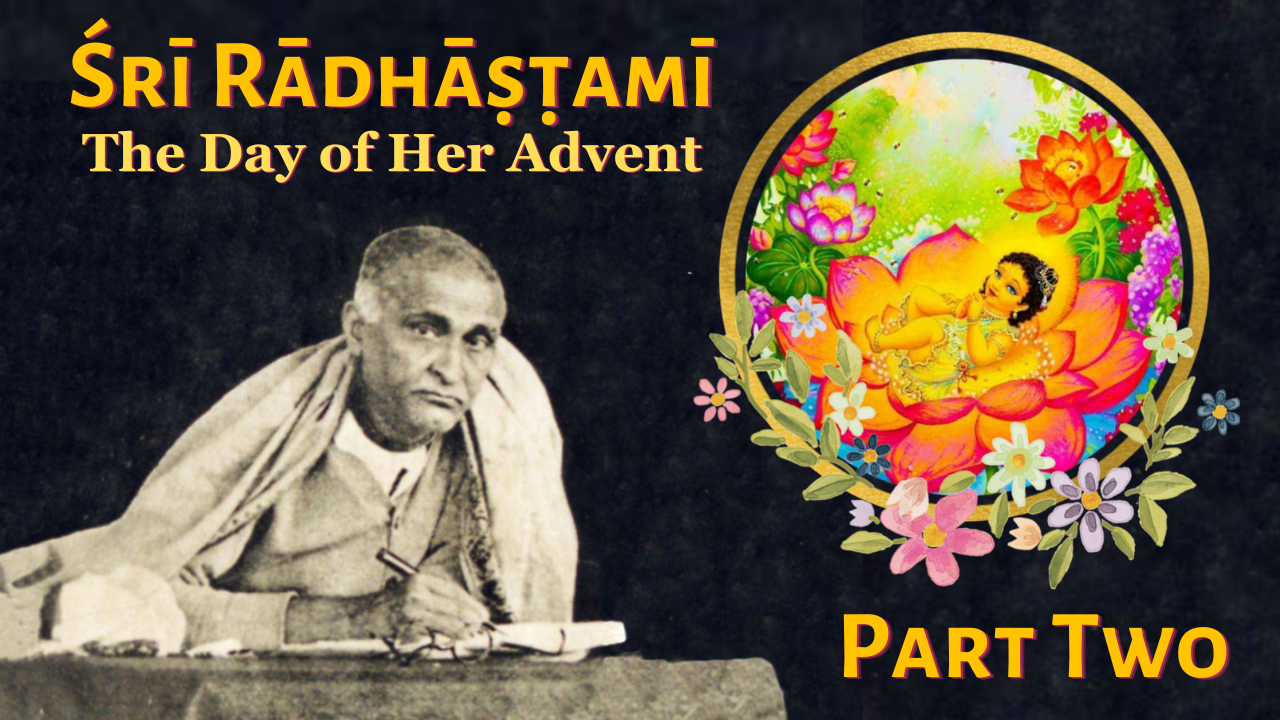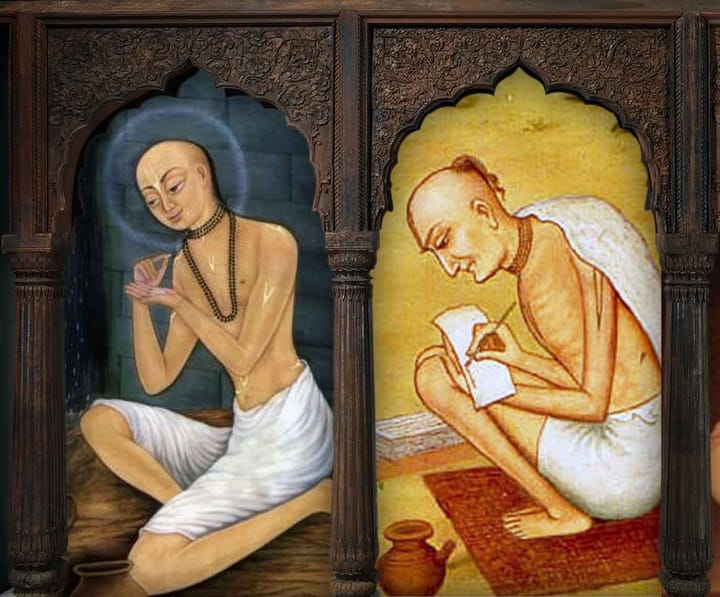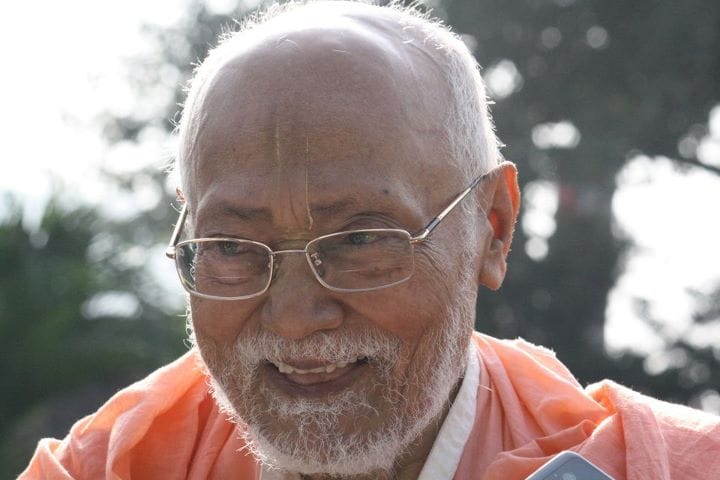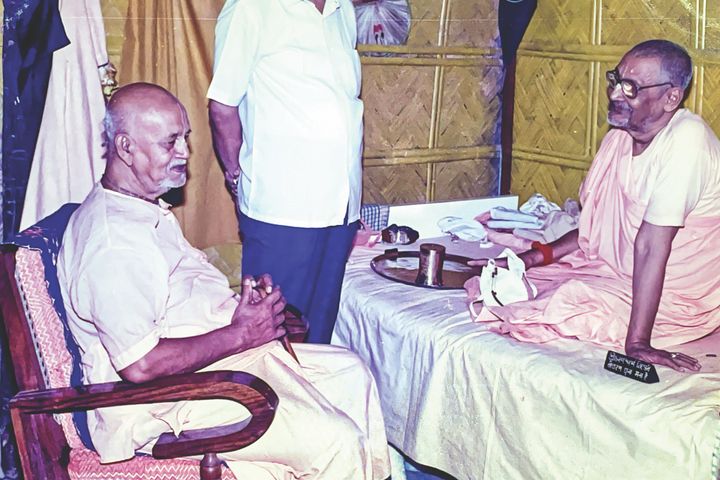Śrī Rādhāṣṭamī – The Day of Her Advent 🪷 PART TWO

Śrī Rādhāṣṭamī
The Day of Her Advent (PART TWO)
by Śrīla Bhaktisiddhānta Sarasvatī Ṭhākura Prabhupāda
A discourse delivered in the Sārasvata assembly hall of Śrī Gauḍīya Maṭha, on Śrī Rādhāṣṭamī evening, 19 September, 1931
Published in the Weekly Gaudiya, Year 10, Issue 11, October 1931
Translated by the Rays of The Harmonist team for Issue No.20, Kārtika 2009
Kṛṣṇa is bound by Vārṣabhānavī ’s prema
The single most cherished aspiration of the topmost devotees is to serve the lotus feet of Śrī Rādhā:
śrī rādhā-pada-dāsyam-eva
paramābhīṣṭaṁ hṛdā dhārayan
karhi syāṁ tad-anugraheṇa
paramādbhutānurāgotsavaḥ
Rādhā-rasa-sudhānidhi (259)
[When will I relish that most wonderful festival of attachment to the lotus feet of Śrī Rādhā by keeping that most supreme ambition of serving them, in the core of my heart?]
In an aṣṭa-padī [1], Śrī Jayadeva has said:
kaṁsārir-api saṁsāra-
vāsanā-bandha śṛṅkhalām
rādhām ādhāya hṛdaye
tatyāja vraja-sundarīḥ
Gīta-govinda (7.1)
[Even though Kṛṣṇa is the one who causes everyone’s happiness to swell, and even though He is the Supreme hero who was destined to conquer evil King Kaṁsa, His heart had been bound with the fetters of Śrīmatī Rādhikā’s love. Since, within His heart, He was always absorbed in Rādhikā’s prema, which is the quintessence of madhura-rasa, He naturally abandoned all the countless other beautiful vraja-devīs.]
[1] A song composed of eight stanzas. Gīta-govinda consists of twenty-four aṣṭa-padīs.
At the rāsa-sthalī (the place of the rāsa dance), all the gopīs are present with Gopīnātha, who is engrossed in rasa-laden pastimes with them. When the daughter of Vṛṣabhānu Mahārāja, Vārṣabhānavī Śrī Rādhā, arrived there, She saw that countless gopīs were immersed in serving Bhagavān by dancing with Him in a circle. Reproaching that sight within Her mind, She thought, “Today My Kṛṣṇa is in the hands of others and My own confidantes are busy enjoying themselves!” To effect a feeling of separation (vipralambha-bhāva), which actually nourishes the thrill of meeting (sambhoga-rasa), Vārṣabhānavī ran away from the rāsa-sthalī instead of entering it and joining the rāsa dance.
Remain proudly in Her ānugatya
It is at this point that Śrī Jayadeva has written:
Kṛṣṇa, the enemy of Kaṁsa, suddenly broke away from the rāsa-sthalī. Rādhā is likened to a chain that binds Śrī Kṛṣṇa in intense desires to relish the essence of Her love. With thoughts of that Śrī Rādhā weighing deeply on His heart, Kṛṣṇa deserted all the other beautiful vraja-devīs and went to search for Her, unaccompanied by anyone else.
When someone abandons the ānugatya (guardianship, or tutelage) of Rādhikā, any skill he may display in gratifying Kṛṣṇa’s senses is not actually faithful to the true propensity of his soul: exclusive devoutness to serving Śrī Kṛṣṇa. Although all the gopīs are direct manifestations (kāya-vyūha) of Rādhikā, it is particularly those confidantes of Kṛṣṇa’s sarvasva, Śrīmatī Rādhikā who, while remaining proudly in Her ānugatya, can provide Kṛṣṇa the utmost delight.
śrīmān rāsa-rasārambhī
vaṁśī-vaṭa-taṭa-sthitaḥ
karṣan veṇu-svanair gopīr-
gopīnāthaḥ śrīye ’stu naḥ
Śrī Caitanya-caritāmṛta (Ādi-līlā 1.17)
[Śrīman Gopīnātha, who stands at the base of Vaṁśī-vaṭa and who orchestrates the loving emotions (rasa) that arise during the rāsa dance, attracts all the gopīs by the sweet sound of His flute, drawing them to His side. May He bless us with all auspiciousness.]
Contemplating enjoying sambhoga, that is, contemplating enjoying the company of Śrī Govinda without being in the ānugatya (guidance, or tutelage) of She who means everything to Him, is something we shall never do. To shed light on this matter, Śrī Jayadeva Gosvāmī, the author of the aṣṭa-padī, reveals something that supplements the description in Śrīmad-Bhāgavatam. He says, “tatyāja-vrajasundarīḥ – abandoning the beautiful vraja-devīs.” Kṛṣṇa abandoned the gopīs even as they danced with Him during the rāsa-līlā. He left them all to find Śrīmatī Rādhikā, while carrying Her in the deepest chamber of His heart. The binding chains of love of the other gopīs are faint, feeble and vulnerable when compared to the chains of Vārṣabhānavī’s love, which are immensely and profoundly powerful.
After Śrī Kṛṣṇa had left them, all the gopīs took shelter of Vṛṣabhānu-nandinī’s adhirūḍa-mahābhāva[2]. Overwhelmed by emotions such as mohana [3] and mādana [4], they set out in search of Śrī Kṛṣṇa. They all understood that without taking shelter at the feet of govinda-sarvasva Śrī Vārṣabhānavī, madhura-rasa can never find complete nourishment.
[2] The final limit of mahābhāva is known as adhirūḍha-bhāva. It is the very essence of Kṛṣṇa’s pleasure-giving potency and it is characterized by the feeling that each moment is like a day of Brahmā (billions of years) when one is separated from Kṛṣṇa, and that an entire day of Brahmā is like a moment when one is meeting Him.
[3] The exalted state of prema known as mohana manifests in Śrī Rādhā at the time of Her separation from Śrī Kṛṣṇa. In this state, She experiences extreme anguish due to Her longing to meet with Him.
[4] The exalted state of prema known as mādana, or mādanākhya-mahābhāva, is eternally and splendidly manifest in Śrī Rādhā, to the exclusion of all others. It is the highest stage of mahābhāva and only arises at the time of Śrī Rādhā's meeting with Śrī Kṛṣṇa. It never arises in any other gopī, including Lalitā and the other principle sakhīs.
All moods and expressions of love with which the gopīs perform their services exist simultaneously in Śrī Vārṣabhānavī, and only in Her do such moods of love exist in their entirety and perfection. Therefore, abandoning all the other gopīs, who were each absorbed in one of the eight moods of a heroine, such as the feeling of separation from Her lover (proṣita-bharttṛkā), Kṛṣṇa left the rāsa dance, forcefully drawn by Śrī Vārṣabhānavī’s power of attraction, for She alone possesses all these bhāvas to their full extent. As such, He set out in search of She who verily attracts the all-attractive being.
The gopīs are expansions of Rādhikā. Because they are eternally the fractional portion (aṁśa) of She who is the originating and complete whole (aṁśinī), they could not bind Kṛṣṇa, for He is solely Her property. Rādhikā thus extracted Kṛṣṇa, He who attracts everyone, from the rāsa dance.
These topics can only be fathomed by someone if the innate faculties of his soul (ātma-vṛtti) have already awakened to the taste of divine amour (madhura-rati). Yet still, if someone’s heart is the seat of intense parental love (vātsalya-rasa), then they, too, can understand the sweetness and beauty of the pastimes of She who is the complete whole.
The glory of Her ānugatya
The gopīs came to the place where the rāsa dance was to take place, attracted by Kṛṣṇa and pulled to Him by the sweet melodies of His flute. Then, when Śrī Vārṣabhānavī, the embodiment of divine amour (madhura-rati) in its fullest form, desired to serve Śrī Nanda-nandana Gopīnātha Rādhā-ramaṇa, the object of our service, He abandoned the less extraordinary attraction of all the other gopīs and became a victim of Śrī Vārṣabhānavī’s charm. The most attractive being became helplessly attracted. Therefore, when liberated souls gain the qualification required to fathom Rādhikā’s position, they understand the following:
karmibhyaḥ parito hareḥ priyatayā vyaktiṁ yayur jñāninas
tebhyo jñāna-vimukta-bhakti-paramāḥ premaika-niṣṭhās tataḥ
tebhyas taḥ paśu-pāla-paṅkaja-dṛśas tābhyo’pi sā rādhikā
preṣṭhā tadvad iyaṁ tadīya-sarasī tāṁ nāśrayet kāḥ kṛtī
Śrī Upadeśāmṛta (10)
[One who selflessly performs virtuous acts in accordance with the path of karma-yoga is superior to those who merely seek to fulfil their selfish desires. The brahma-jñānīs, who by dint of their spiritual knowledge are transcendental to the three modes of material nature, are more dear to Śrī Kṛṣṇa than those pious followers of the karma path, who are forever occupied in performing virtuous deeds. More dear to Śrī Kṛṣṇa than the brahma-jñānīs are His devotees like Sanaka, who have abandoned the pursuit of knowledge and who consider bhakti alone to be the best path. But pure devotees like Nārada, who are resolutely fixed in prema for Śrī Kṛṣṇa, are even more dear to Him than all such devotees. And yet the lotus-eyed vraja-gopīs, whose very lives belong solely to Kṛṣṇa, are even more beloved to Him than all such loving (premī) devotees like Nārada. Amongst all those beloved gopīs, Śrīmatī Rādhikā is more dear to Śrī Kṛṣṇa than His own life, and in precisely the same way, He dearly loves Her pond, Śrī Rādhā-kuṇḍa. Therefore, what highly fortunate, spiritually intelligent person would not reside on the banks of Śrī Rādhā-kuṇḍa in a state of transcendental consciousness, performing bhajana of Śrī Kṛṣṇa’s eightfold daily pastimes?]
kṛṣṇasyoccaiḥ praṇaya-vasatiḥ preyāsibhyo’pi rādhā
kuṇḍaṁ cāsyā munibhir abhitas tādṛg eva vyadhāyi
yat preṣṭhair apy alam asulabhaṁ kiṁ punar bhakti-bhājāṁ
tat premedaṁ sakṛd api sarāḥ snātur āviṣkaroti
Śrī Upadeśāmṛta (11)
[After thorough deliberation on the matter, the sages have unanimously declared (in the Padma-purāṇa) that just as amongst all the gopīs, Śrīmatī Rādhikā is the foremost object of Śrī Kṛṣṇa’s great love, in precisely the same way this pond of Hers is also the topmost object of His love. Upon one who simply bathes in its waters just once with great devotion, Śrī Rādhā-kuṇḍa bestows that rare treasure of gopī-prema, which is so immensely difficult to attain even for such dear devotees of Bhagavān as Nārada – what to speak of ordinary sādhakas.]
Śrī Rādhikā is the abode of Śrī Kṛṣṇa’s intense love (praṇaya). Amidst His other beloveds, She is foremost and dear most in every respect. Even Uddhava and other exalted devotees pray for the foot-dust of the gopīs. Yet, these gopīs consider that their lives will be successful if they can attain a position in the ānugatya (guidance, or tutelage) of Śrī Vārṣabhānavī. And the most exalted devotees, those who are inclined toward madhura-rasa and who have reached the summit of bhakti to the Supreme Lord, take shelter at the place of Her pastimes and bathe in the sacred waters of Her pond, Śrī Rādhā-kuṇḍa.
In pursuit of awakening the faculties of awareness within the soul proper, they constantly immerse themselves in the holy waters of that lake and dwell by its side. The confidantes of Śaibya, Candrā and other rival gopīs do not even qualify to approach that place. To perpetually live by the bank of such a pond, and to bathe in its transcendental waters by following the soul’s own faculties of awareness is not affordable for any ordinary, fortunate person.
As long as the transcendental nature of Śrī Vārṣabhānavī’s age and of Her childish innocence, even in the midst of Her dawning adolescence, does not become the subject of our reflection, we cannot understand the glory of achieving a position in Her ānugatya.[5]
[5] Although Śrīmatī Rādhikā is apparently an eternal kiśorī (adolescent), She remains intrinsically a kaumari (pre-adolescent).
We must know Her name
In order to perform bhajana, those who study Śrīmad-Bhāgavatam must know the name of their venerable deity, for one can only perform bhajana beginning from nāma. One cannot begin his bhajana directly from līlā. It is said in scripture:
prathamaṁ nāmnaḥ śravaṇam-antaḥ-karaṇa-śuddhyartham-apekṣyaṁ | śuddhye cāntaḥ-karaṇe rūpa-śravaṇena tad-udaya-yogyatā bhavati | samyag-udite ca rūpe guṇānāṁ sphuraṇaṁ sampadyate sampanne ca guṇānāṁ sphuraṇe parikara-vaiśiṣṭyena tad-vaiśiṣṭyaṁ sampadyate | tatas teṣu nāma-rūpa-guṇa-parikareṣu samyak sphuriteṣu līlānāṁ sphuraṇaṁ suṣṭhu bhavatīty-abhipretya sādhana-kramo likhitaḥ |
Śrīla Jīva Gosvāmī’s Krama-sandarbha commentary on Śrīmad-Bhāgavatam (7.5.18)
First, a person must hear and chant the holy name to achieve purity of consciousness. Thereafter, when his heart has become pure, it is a fit appearance place for the Lord’s beautiful form, and as soon as the Lord’s form thoroughly manifests in his heart as a result of hearing descriptions of that form, the bhakta experiences revelations about the Lord’s qualities. As the Lord’s qualities fully unfold, the defining characteristics of His associates and thus His own defining characteristics, that is, His unique interrelationship with each of them, are exhibited. After that, when the Lord’s name, form, qualities and associates have completely manifested in the bhakta’s heart, the Lord’s pastimes blossom in their full splendour. The progression of sādhana has been delineated in this way with the intention of acquainting the bhaktas with the sequential process involved in the Lord’s appearance within their hearts.
Therefore, unless we begin, on account of attraction to śrī nāma, to contemplate within our heart the transcendent rasas, we are not qualified to study the form, qualities and pastimes of the Lord. People may have perfected their comprehension and expression of the words of scripture from an external, worldly perspective, yet as long as their conduct remains contrary to the conduct of realized souls, narrations of the Lord’s rāsa-līlā are beyond the reach of their understanding. Therefore, Śrī Gaurasundara has instructed us about nāma-bhajana (divine worship in the form of chanting the holy name).
Kṛṣṇa’s name is tāraka-brahma-nāma, the holy name who delivers us. Alongside His name we can see the word hare. As long as one does not gain realized knowledge of the direct meaning (vidvad-rūḍhī) of that word, one remains at a great disadvantage. For that matter, when we try to understand the word rāma, also, we are usually carried away by historical considerations [6].
[6] Historically, people usually interpret rāma as Lord Rāmacandra.
Too often, the purity of our intellect is sullied and ruined by figurative and metaphorical doctrines, metaphysical theories, and that preposterous act of projecting man’s nature on the figure of God. If someone tries to obtain the darśana of Śrī Śrī Rādhā-Govinda but lacks knowledge of Reality’s secret truths (rahasya-jñāna), he finds that his vision is veiled.
In the mahā-mantra, the name Harā , which refers to Śrī Vārṣabhānavī, becomes Hare when it is uttered in the vocative case. In a similar way, the name Rādhikā-ramaṇa Rāma becomes Rāma when it is uttered as a personal address. Those who have attained neither eligibility to enter the realm of madhura-rati (divine amour) nor knowledge of Reality’s hidden truths (rahasya-jñāna) assume that the name Hare is simply Hari in the vocative case and therefore another name of Bhagavān Himself. Some even say that the word rāma means ātmārāma, or He who is satisfied in Himself, and they forgo scrutinizing the matter any further.
To state that the Lord, who is known as Puruṣottama (the Supreme Person), exists in solitude is to present only half of His identity. Statements that fail to account for the other half of reality just deceive us. And when we are cheated of the understanding that there exists a Supreme Divine Couple, we are bound to reject the conception of the unity and identity of the potent (śaktimān) with His potency (śakti). And as a consequence of this, whatever limited understanding of Puruṣottama we may have already attained, also degenerates, terminating in the conception of an emasculated, impotent God (klīva-brahma).
The conception of Śrī Śrī Rādhā-Govinda is of the Absolute Truth in utmost completeness. On the other hand, the conception of Puruṣottama in solitude, where the Lord exists alone as the supreme reality, cannot bring the ānugatya-dharma of the soul (the innate commitment of the soul to remain in the charge and care of a higher guide) past the moods of parenthood (vātsalya), friendship (sakhya), and servitude (dāsya). It never touches on the topic of unnata-ujjvala-rasa. And describing the Lord by His titles like brahma or Paramātmā, can never convey the fullness of the Absolute Truth that is so effectively established by names such as Rādhā-nātha or Rādhā-ramaṇa.
The summit of transcendence
All those souls who, while seeking out the kingdom of prema-bhakti, journey through sādhana-bhakti and reach beyond it to the stage of bhāva-bhakti, must realize that divine love of Śrī Vārṣabhānavī, which is the topmost summit of prema-bhakti, is only available in Her ānugatya. Without being in Her ānugatya, the soul gains but a feeble eligibility within the realms of spiritual existence.
When we transcend Devī-dhāma (the material world, which is presided over by the goddess of the illusory energy) and cross the Virajā River (the threshold between the divine and mundane worlds), even transcending Brahma-loka (the realm of the impersonal absolute) and totally evading the conception of opulence found in the paravyoma (the spiritual sky, or kingdom of God); when we even surpass the intimate moods of friendship and parental love found in Goloka and at long last, grounded in the perfect, eternal (nitya-siddha) identity of our soul, we become acquainted with the conception of Śrī Rādhā-ramaṇa, then our eligibility shall be so exalted that we shall be the most fortunate of the fortunate and our service shall rise to the very pinnacle of its perfection.
Such a state cannot simply be called “realization”, nor even aparokṣa-anubhuti – direct experience of the imperceptible absolute – as seen in the language employed by the jñānīs. No. What we shall attain is the extraordinary functions of love known as mohana and mādana. What we shall experience is known by names like udghūrṇa [7], citra-jalpa [8] and mahābhāva (the ultimate stage of ecstatic love of God).
[7] The state of divine-madness (divya-unmāda) in which one deliriously endeavours to serve the beloved, despite their absence, is known as udghūrṇa. Rādhikā experienced udghūrṇā when Kṛṣṇa departed for Mathurā.
[8] The incoherent, delirious babbling resulting from intense longing is known as citra-jalpa. C.f. Śrīmad-Bhāgavatam 10.47 (Bhramara-gīta).
Now we live confined within our gross bodies, which consign profuse obstructions to such experiences. Even the sensitivity achieved by our subtle bodies actually still encumbers us. If our ātmā-vṛtti, the very calling of our soul, cannot find unimpeded and unceasing shelter in the ānugatya of Śrī Vārṣabhānavī, then we can never grasp even the slightest hint that such achievements exist. So, taking the foot-dust of the foremost rūpānuga, Śrīla Dāsa Gosvāmī, upon our heads, we fervently pray:
hā devi! kāku-bhara-gadgadayādya vācā
yāce nipatya bhuvi daṇḍavad udbhaṭārtiḥ
asya prasādam abudhasya janasya kṛtvā
gāndharvike! nija-gaṇe gaṇanāṁ vidhehi
Śrī Gāndharvā Samprārthanāṣṭakam (2)
[O Devī Gāndharvike! I am suffering greatly and therefore, today, I am throwing myself on the ground like a stick and desperately imploring You, with a choked voice, to be merciful to this fool and count me as one of Your own confidantes.]



Comments ()